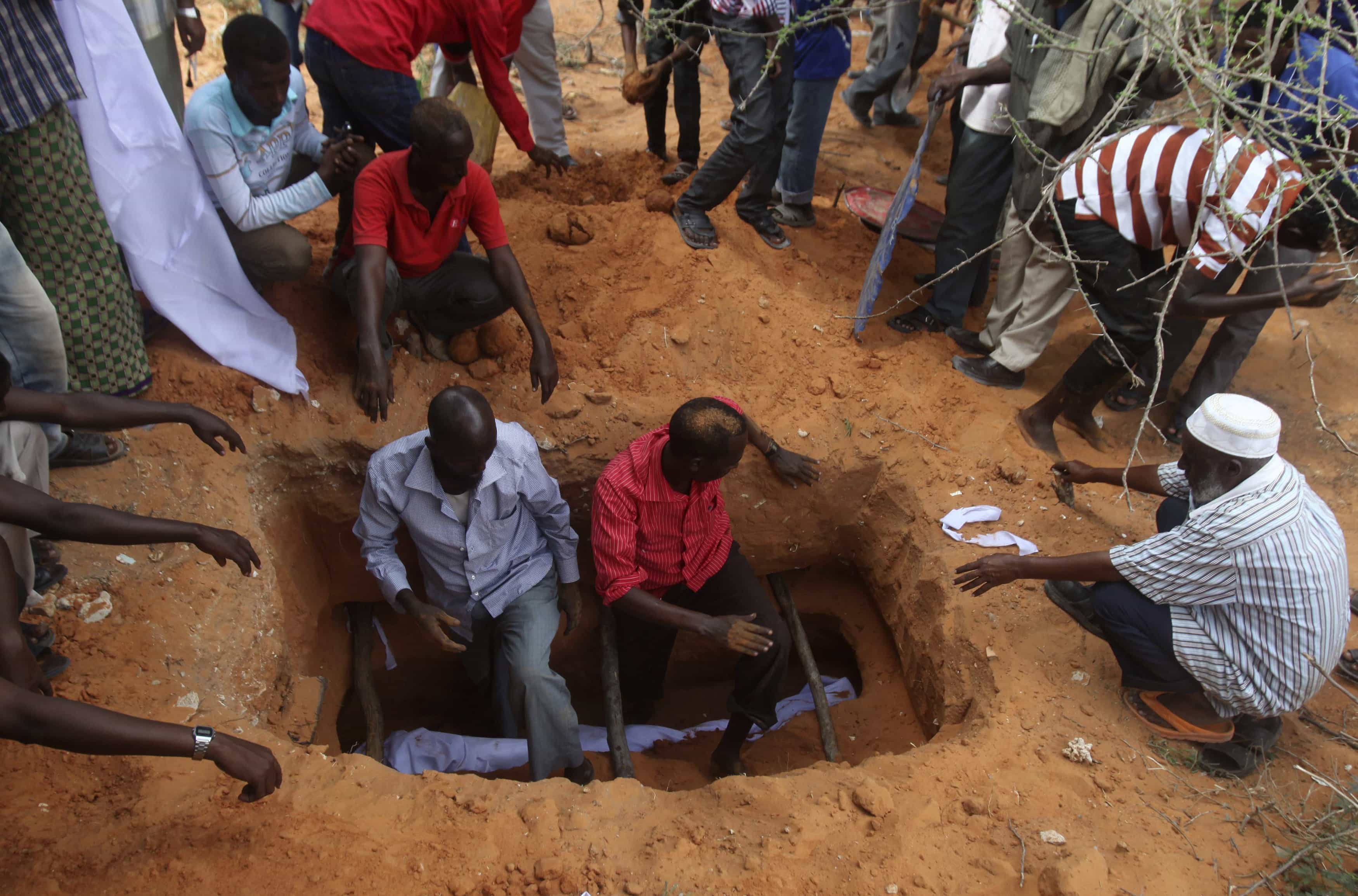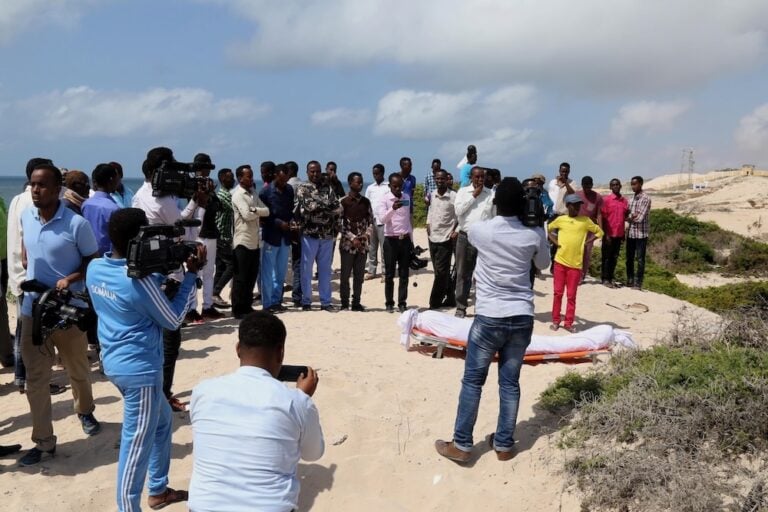Two Somali journalists have been killed in the past month, while three radio stations have been banned in the semi-autonomous region of Puntland.
It is never an easy time to be a journalist in Somalia. But the failure of the Somali government to improve security, including for the media, and increasingly authoritarian moves against the press in the semi-autonomous region of Puntland are not helping, as the recent deaths of two Mogadishu-based journalists show. In Puntland, a ban imposed on three foreign-funded radio stations raises troubling questions about the direction that the democratic process is taking in the semi-autonomous region.
Deaths in Mogadishu
Late on Sunday, March 24, female reporter Rahmo Abdukadir was shot dead by two gunmen while on her way home in the Yaaqshiid neighbourhood, according to reports. She worked for Radio Abduwaq, AFP reported. It is not clear why she was targeted, reports say.
Mohamed Ali Nuxurkey, a journalist for the Mogadishu-based Mustaqbal Radio, died on Monday, March 18, from injuries suffered after a suicide car bomb went off near the presidential palace, according to the National Union of Somali Journalists (NUSOJ) and other reports. He was 28. His colleague Abdirashid Nor Ibrahim was also injured in the attack.
Nuxurkey and Ibrahim were waiting for public transport to the radio station when the bomb exploded, NUSOJ reported. Nuxurkey was then brought to Madina hospital, where he was pronounced dead. He was a contributor to the VOA Africa Service, and a member of both NUSOJ and the Somali Media for Environment, Science, Culture, Health and Agriculture (SOMESHA). He is survived by his wife and a two-month-old baby.
IPI Deputy Director Anthony Mills said: “We offer the families of Rahmo Abdukadir and Mohamed Ali Nuxurkey our condolences. Their deaths underline the grave insecurity that prevails in Somalia, in particular for journalists. The government must make a priority of tracking down the killers of media workers and holding them accountable before the courts. Otherwise the climate of impunity will continue to flourish.”
Nuxurkey and Abdukadir are the second and third journalists to be killed in Somalia this year, according to the IPI Death Watch.
Puntland Broadcasters Silenced
An edict issued by Puntland Information Minister Mohamoud Aideed in March 2013 banned all of the radio stations located in the semi-autonomous Puntland region from broadcasting material that is not sanctioned and licensed by the government, including Radio Ergo, Radio Bar-Kulan and Radio Hirad, according to journalists and news reports.
The stations are based outside Puntland and do not own their own FM transmitters in the region; instead, they provide content for free to local radio stations. A journalist working for one of the three stations told IPI that the stations mainly report on social issues like health, education and gender, but also cover governance. She wished to remain unnamed because the issue is politically sensitive.
Indeed, all three representatives from the stations that IPI asked that their names be withheld. They believe that the stations were banned in order to silence independent reporting on the Puntland elections, a process that is making Puntland’s leaders “nervous,” as one journalist put it.
Presidential elections were scheduled to be held in January 2013, but Puntland’s President Abdirahman Mohamed Farole postponed them for a year. The announcement, made in late 2012, resulted in street violence, and local journalists told IPI that the president has been criticized for failing to register Puntland voters and accused of trying to maintain his grip on power.
It would not be the first time that a radio station was targeted for critical reporting. In October 2012, the Bosaso office of Horseed FM was shut down by the authorities, who accused it of threatening “security” but did not provide evidence, as IPI reported at the time. The station is part of the Horseed Media news network, which is based in The Netherlands. Executive director Mahad Mussa told IPI at the time that he believed the station was targeted for reporting on sensitive issues, such as the postponement of elections.
Speaking with IPI about the latest ban on foreign radio, Mussa and other journalists voiced a secondary theory as to why the ministry of information was keen to block their broadcast. As one journalist, who wished to remain unnamed, put it: “Government smells money” and is trying to “shake the food tree”.
Several journalists IPI spoke to believe that the Puntland information minister is trying to put financial pressure on the local FM stations, because he wrongly assumes they are being paid to carry foreign content. But station representatives told IPI this is not the case. “We do not compensate the local radio stations for re-broadcasting our programs and material,” one station director told IPI
Somali journalist acquitted in rape report case
In a positive development, last week the Somali Supreme Court overturned the conviction of Abdiazaz Abdinur Ibrahim, who had spent two months in prison for “offending state institutions” because he reported on the rape of Somali woman.
Ibrahim’s case garnered worldwide attention when he was arrested in January after interviewing a woman who alleged that she had been raped by Somali security forces. Ibrahim was subsequently sentenced to one year in prison but only served two months of his original sentence. The alleged victim was also sentenced to a year in prison but has also been released.
While it is good news that Ibrahim was released, the fact that he was arrested in the first place is deeply troubling.
In the recently published interview with Al Jazeera, Ibrahim condemned working conditions in Somalia: “There is nowhere like Somalia for journalists to work in. Somalia is a country with many problems. The country is destroyed because of the civil war. We can’t go to many parts of the country and to the places we can go to we have to worry and think about our safety. Journalists are killed and arrested. Personal safety for journalists is not good-it is very bad.”



